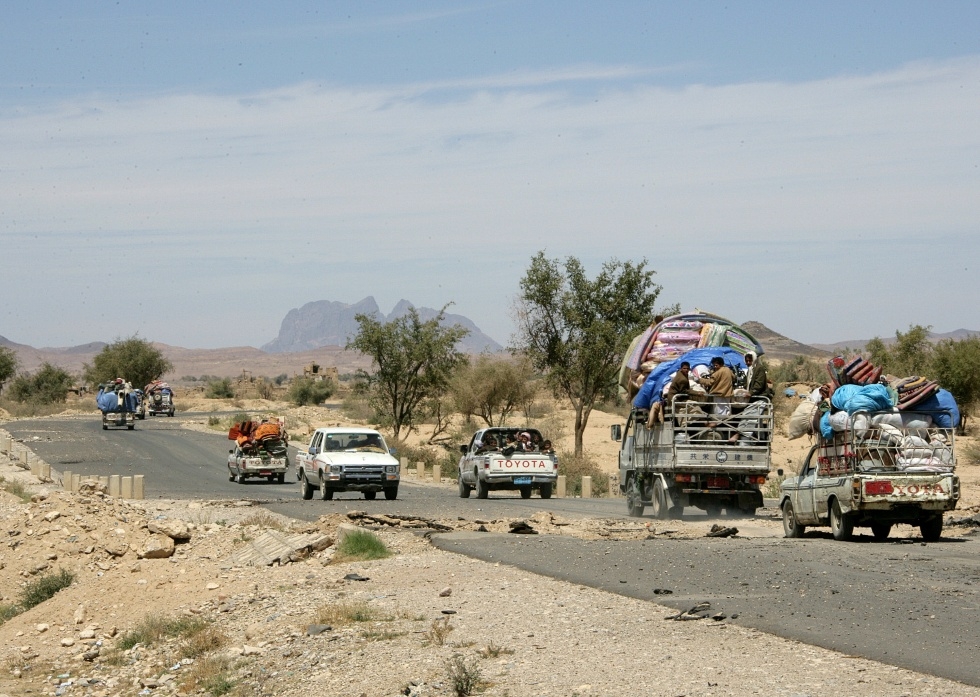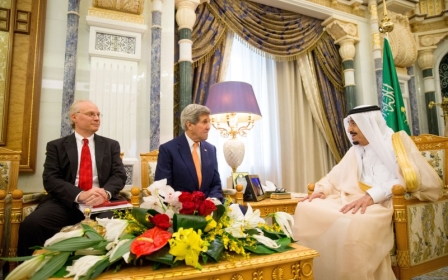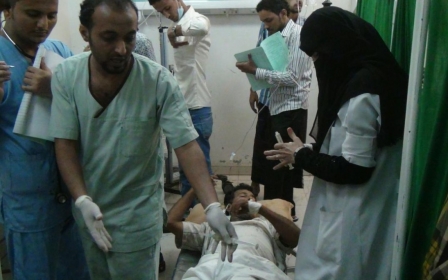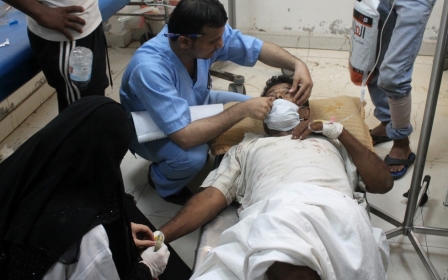Saudi Arabia bombs Houthi stronghold after cross-border shelling

A Saudi-led coalition hit Yemen's Saada province, a Houthi stronghold, on Friday, hours after dropping leaflets that warned all civilians to flee.
According to the leaflets, the main roads in the city of Saada would be open for people trying to leave the city until sundown.
But there were few reports of people leaving the city as some commentators said there was not enough fuel for remaining residents to leave.
Abdulrahman al-Razhi, a 20-something Yemeni studying in Malaysia who grew up in Saada, told MEE on Friday that he was very worried about his family who have remained.
"They are not safe. There is shelling from across the border in Saudi Arabia," Razhi said. "They are hiding in the province – they have places they can hide in the mountains. They hide in the mountains at night. There are a lot of people doing that."
"Nobody is leaving by car, not even the rich people," he said. "There is no fuel, and not everyone has cars. People are also afraid to leave by car because they know that the roads are also a target. Two days ago, a food truck was blown up as it tried to deliver supplies in Saada."
He said the leaflets that the Saudi-led coalition had dropped had reminded him of "what the Israeli army did in the war last summer in Gaza."
"They drop leaflets and warn people to leave, and then they bomb it at night. Nobody can sleep. It’s barbaric," Razhi told MEE.
Saudi Arabia had vowed on Thursday to bomb Houthi strongholds in Yemen “without pause” in response to cross-border shelling by the group, hours after discussing the possibility of a humanitarian ceasefire.
Houthi fighters, who have forced Yemen’s President Hadi into exile in the Saudi capital Riyadh, have been shelling Saudi towns near the border for the past week.
Five people were killed by attacks on Wednesday that targeted the border town of Najran, where schools have been forced to close.
Responding to the attacks, the spokesperson for the Saudi-led military campaign warned that the Houthis had crossed a “red line”.
“The security of Saudi Arabia is a red line that has been crossed, and the Houthis will pay the price,” Brigadier General Ahmed Assiri said during a press conference in Riyadh.
The strikes were launched from the Houthi stronghold of Saada province in a mountainous region of northern Yemen, according to Assiri.
In retaliation for the strikes, Assiri said, coalition military jets will bomb the province “24 hours a day without pause”.
The province has already been hit hard by strikes by the coalition, which is led by Saudi Arabia and includes Egypt, Sudan and all the Gulf States except Oman.
The province’s deputy governor told MEE this week that it is now a “disaster area”, after airstrikes “decimated” roads, government buildings and military sites.
Human Rights Watch has documented the use of US-made cluster bombs, which contain sub-munitions liable to detonate long after the weapon is dropped. Many of these widely banned devices have fallen near civilian areas in Saada.
Over 30,000 people in Saada have been displaced since the latest round of fighting began on 26 March, according to Yemeni observer Ruba al-Eryani.
Assiri’s promise of “stern” retaliation for cross-border attacks came hours after Saudi Arabia’s foreign minister announced that they were working towards a humanitarian ceasefire.
After meeting with US Secretary of State John Kerry in Riyadh, Foreign Minister Adel al-Jubeir said any truce would depend on co-operation from the Houthi rebels.
Saudi Arabia is demanding that the Houthis, who have continued to advance despite the six weeks worth of bombing, lay down their weapons in order for the truce to be implemented.
Houthi officials have yet to respond to the call.
The proposed ceasefire is backed by Kerry, who said it was a “major opportunity” to ease the crisis, in which 1,400 people have been killed since late March according to UN figures.
The truce would mean “no bombing, no shooting, no movement or repositioning of troops to achieve military advantage,” Kerry said on Thursday afternoon.
The proposed pause could last five days, and would be renewable as long as conditions were met – Saudi officials said the start date would be announced “soon”.
However, later in the day Brigadier General Assiri promised to step up airstrikes targeting Houthi leaders thought to be holed up in Saada, saying that “every inch is a target”.
Baraa Shibani, a prominent Yemeni human rights activist, said the province was the target of heavy bombing overnight on Thursday.
New MEE newsletter: Jerusalem Dispatch
Sign up to get the latest insights and analysis on Israel-Palestine, alongside Turkey Unpacked and other MEE newsletters
Middle East Eye delivers independent and unrivalled coverage and analysis of the Middle East, North Africa and beyond. To learn more about republishing this content and the associated fees, please fill out this form. More about MEE can be found here.




